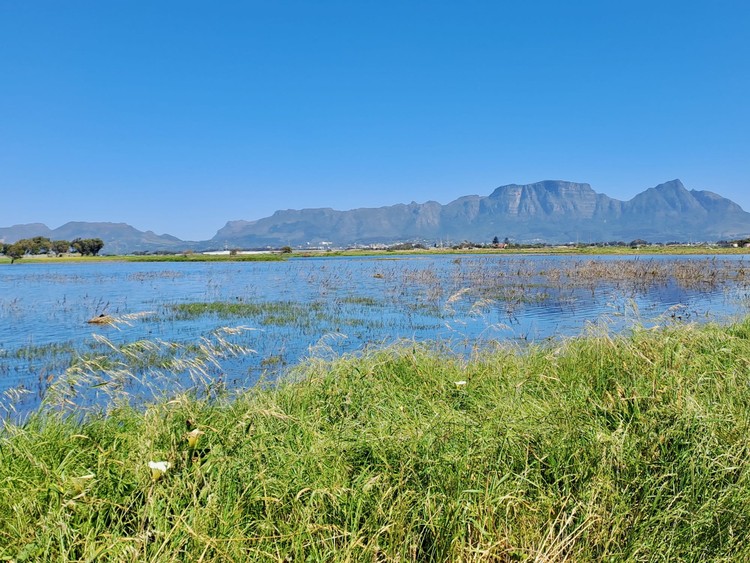Sand mining company appeals against refusal of water licence in Philippi
A campaign to preserve the horticultural area says the silica mine will impact food security and the Cape Flats Aquifer
The area in the Philippi Horticultural Area (PHA) where Keysource Minerals is proposing to mine. Photo: Liezl Human
- Keysource Minerals, a silica sand mine, is appealing a decision by the Department of Water and Sanitation to reject its water use licence.
- The Philippi Horticultural Area Food & Farming Campaign raised concerns about the mine’s impact on wetlands and the Cape Flats Aquifer.
- Keysource Minerals says its Athlone mine is running low and many big Western Cape industries are dependent on the silica.
- The Water Tribunal will hear the matter in April 2024.
A silica sand mining company that has set its sights on 50 hectares of land in the Philippi Horticultural Area (PHA) in Cape Town is appealing against the decision by the Department of Water and Sanitation (DWS) to refuse it a water use licence.
Keysource Minerals is owned by Ardagh Glass Packaging (formerly Consol Glass), the largest glass manufacturer in sub-Saharan Africa. It produces glass for big food and beverage companies such as Coca-Cola, Distell and Heineken. The company says it is running out of silica reserves at its current mine in Athlone.
But the PHA Food & Farming Campaign says in its comments on the water use licence application that mining will cause a “significant and unacceptable impact” on the environment, the Cape Flats Aquifer, and the surrounding farmlands. The campaign says mining the area is not in the public interest, and will affect food security in Cape Town.
“The PHA is a drought proof farmland, the value of which has become incrementally more clear in the face of the role it must play in offsetting the worst effects of climate change,” the PHA Campaign commented.
Reasons provided by the DWS for refusing the licence include: the lack of a compensation plan for the impact on the wetland; the impact on nearby Zeekoevlei; the loss of habitat and biodiversity; the effect of increased stormwater runoff on the nearby wetlands; and the impact on recharging of the Cape Flats Aquifer.
Keysource Minerals provided 12 grounds of appeal to the Water Tribunal. The company already holds a mining right and environmental authorisation.
The company denied that its proposed water uses constituted an unacceptable risk to Zeekoevlei, bird species or surrounding wetlands. Keysource said the DWS had failed to consider the “negative socio-economic impact if the water use licence is refused” The company said the mine would supply silica both for glass production and for water purification systems, for example in the wine industry. Keysource said the mining area is “one of the last remaining high-grade silica deposits in South Africa” and not opening the mine would have an impact on jobs.
In its papers, the company says its Athlone mine, which provides all the sand for its Bellville glass plant, is reaching the end of its life, and reserves will be depleted by 2025.
Paul Curnow, CEO of Ardagh Glass Packaging Africa, told GroundUp: “there are no alternative silica sources available”.
“A lack of sand supply in the Cape would result in glass production reducing and eventually stopping completely in the Western Cape,” said Curnow.
He said industries which employ thousands of people are dependent on the development of the new mine.
Curnow said extensive environmental impact assessments showed “no damage” would be done to the aquifer.
“We are sensitive to the fact that compromises need to be found and believe that a solution could be reached to allow our industry and others to continue to operate in the region, while protecting the value of the PHA,” he said.
The DWS confirmed that the matter is set down for hearing by the Water Tribunal for 15 to 17 April 2024.
A map showing the two plots of the prospective sand mine. Source: Cape Farm Mapper by the Western Cape Department of Agriculture.
Support independent journalism
Donate using Payfast

Don't miss out on the latest news
We respect your privacy, and promise we won't spam you.
Next: Richmond land occupiers given refuge in preschool
Previous: Tears and joy as miners return to the surface after hostage drama
© 2023 GroundUp. This article is licensed under a Creative Commons Attribution-NoDerivatives 4.0 International License.
You may republish this article, so long as you credit the authors and GroundUp, and do not change the text. Please include a link back to the original article.
We put an invisible pixel in the article so that we can count traffic to republishers. All analytics tools are solely on our servers. We do not give our logs to any third party. Logs are deleted after two weeks. We do not use any IP address identifying information except to count regional traffic. We are solely interested in counting hits, not tracking users. If you republish, please do not delete the invisible pixel.


